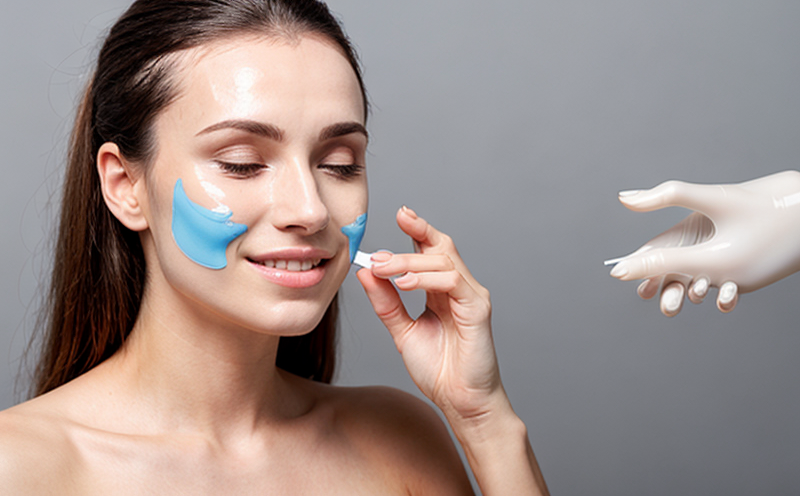USP Rheology Testing of Topical Products
In the pharmaceutical industry, rheological properties play a crucial role in determining the stability and efficacy of topical products. USP Rheology Testing is one such critical procedure that ensures these products meet stringent quality standards before they reach consumers. This testing method evaluates how the product behaves under various shear rates and stress conditions, which are essential for predicting its performance on skin.
Understanding rheological behavior helps in optimizing formulations to ensure uniform application and effectiveness over extended periods. By accurately measuring viscosity, yield point, plasticity, and other relevant parameters, rheology tests provide valuable insights into the texture and flow characteristics of topical products such as creams, lotions, gels, and ointments.
The USP (United States Pharmacopeia) guidelines specify precise methods for conducting rheological testing. These include using advanced instruments like rotational viscometers to measure shear stress and strain rate in a controlled environment. The data collected during these tests is used to validate that the product will not only adhere to regulatory requirements but also perform reliably under real-world conditions.
For effective rheology testing, proper sample preparation is paramount. This involves homogenizing the product according to specific protocols outlined by USP guidelines before conducting measurements at different temperatures and shear rates. The choice of container (such as a cone-plate or parallel plate geometry) impacts the accuracy of results; therefore, selecting appropriate equipment based on the type of topical product being tested is crucial.
Accurate rheological analysis provides several benefits beyond mere compliance checks. It aids in optimizing ingredient selection by identifying those that contribute positively to texture and consistency without compromising safety or effectiveness. Additionally, it supports formulation development by highlighting areas where modifications might improve stability or enhance user experience.
Given the importance of precise measurements in ensuring consistent quality across batches produced by different manufacturers worldwide, adherence to international standards like USP is vital. Compliance not only enhances trust among consumers but also fosters better relationships with healthcare providers who rely on accurate information about product performance.
In conclusion, USP Rheology Testing serves as an indispensable tool for safeguarding the integrity of topical products. Through rigorous evaluation processes, it ensures that each batch meets strict criteria set forth by regulatory bodies worldwide, thereby promoting safer and more effective treatments directly benefiting patients globally.
Eurolab Advantages
EuroLab prides itself on offering comprehensive services tailored specifically to meet the needs of pharmaceutical companies seeking to ensure their topical products comply with regulatory standards. Our expertise in USP Rheology Testing lies not only in our state-of-the-art facilities but also in our highly trained professionals who possess extensive experience working within this field.
Our team consists of certified technicians proficient in operating advanced rheological equipment according to internationally recognized protocols. This ensures consistent, accurate results that can be relied upon by both internal teams and external stakeholders alike. Furthermore, our commitment to continuous improvement means we regularly update ourselves with the latest developments in technology and methodology, ensuring that our clients receive cutting-edge solutions.
At EuroLab, we understand the significance of timely delivery without compromising on quality standards. We offer expedited turnaround times for urgent projects while maintaining the highest level of accuracy. Our flexible scheduling allows us to accommodate busy schedules, whether you need routine testing or one-off assessments.
EuroLab’s commitment extends beyond just providing reliable data; it also encompasses proactive communication throughout each project phase. From initial consultation through final reporting stages, our dedicated account managers ensure that all parties remain informed every step of the way. This approach fosters strong partnerships built on mutual trust and respect – key components in delivering successful outcomes.
In summary, choosing EuroLab for your USP Rheology Testing needs guarantees access to experienced professionals equipped with top-tier facilities capable of handling diverse challenges associated with this specialized service. With our unwavering dedication to excellence, you can rest assured knowing that every aspect of your project will be meticulously attended to, ensuring compliance and quality assurance at all levels.
International Acceptance and Recognition
- The USP Rheology Testing methodology is widely accepted across Europe and other regions because it adheres strictly to international standards such as ISO 18302:2019. This standardization ensures consistency in results regardless of location, which is crucial for multinational corporations operating globally.
- Regulatory bodies like the European Medicines Agency (EMA) recognize USP guidelines as authoritative references when evaluating submissions related to topical products. Compliance with these standards enhances credibility and facilitates smoother approval processes.
Moreover, many leading academic institutions incorporate USP Rheology Testing into their research protocols due to its reliability in providing actionable insights into formulation behavior under varied conditions. This further solidifies its position as an essential tool within the broader pharmaceutical community.
Competitive Advantage and Market Impact
- By ensuring strict adherence to USP Rheology Testing protocols, companies can differentiate themselves by offering superior product quality that meets or exceeds expectations. This competitive edge translates into enhanced brand reputation and increased customer satisfaction.
- The ability to demonstrate compliance with international standards positions firms favorably when competing in global markets where regulatory scrutiny is high. It reassures potential customers about the safety and efficacy of their purchases, fostering long-term loyalty.
From an operational standpoint, accurate rheological testing helps streamline production processes by identifying optimal processing parameters early on. This leads to reduced waste, lower costs, and more efficient resource utilization throughout supply chains. Ultimately, these factors contribute significantly towards achieving higher profit margins without sacrificing integrity or quality standards.





